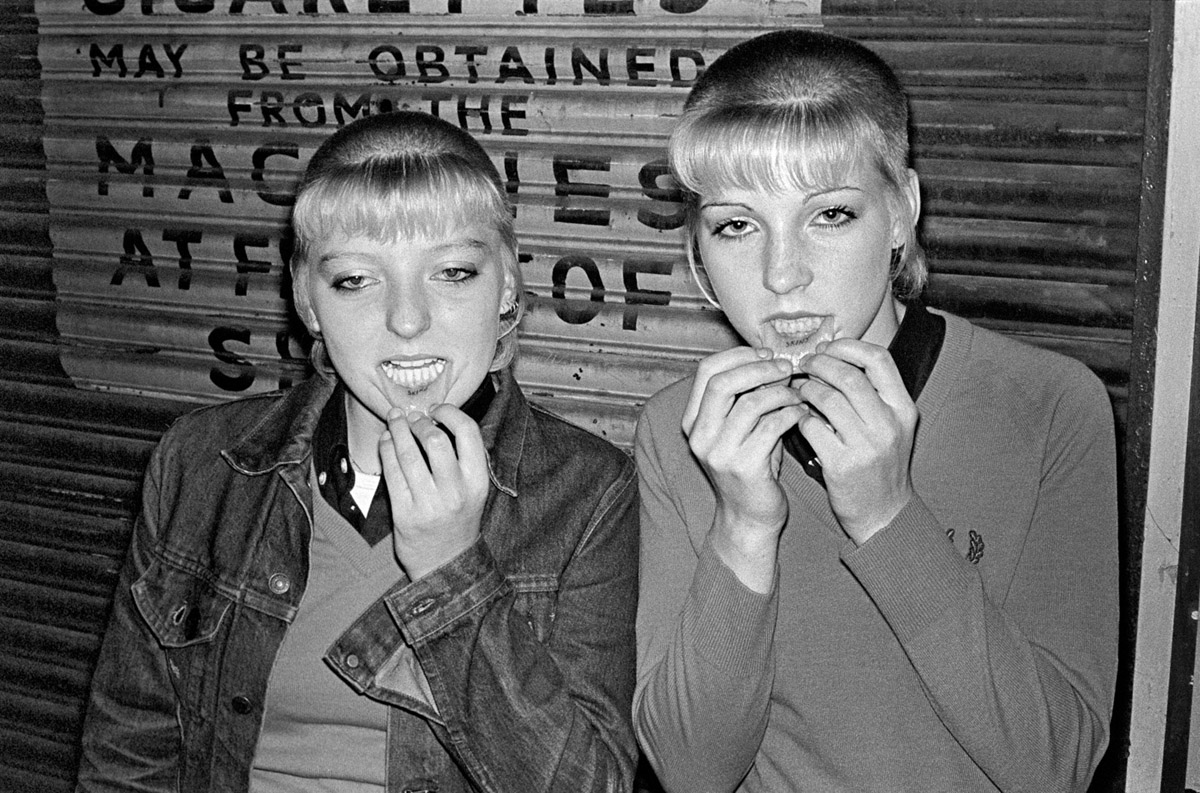Derek Ridgers

"I had a partner and two kids before I started taking photographs and, if not for that, I might have been lost in one of these subcultures myself. Taken drugs, acted badly, maybe even have been a rock star. I’d probably be dead by now. So photography in one sense saved my life."
Could you tell us a bit about yourself, where did you study?
When I was 16 I opted out of my school sixth form and went to Ealing School of Art. Initially I wanted to be a famous painter. Then a great art director. I suppose I still do really but I think those ships may have now sailed.
But I certainly never wanted to be a photographer. It's just that when punk happened I found myself in the right place at the right time, with a camera. Then once I’d started, I could never quite think of a reason to stop. Photography gradually drew me in and took over my life.
You recently had a two person show at Charlie Smith London, with the painter Sam Jackson, curated by Faye Dowling. Could you talk about the show and how it came about?
To be honest, you’d be far better asking the curator Faye Dowling about this. When the suggestion of doing a joint show was first mooted, I felt sure I had a handle on the shows direction but I was wrong. Faye saw a different connection in our work than was the most obvious - words written on faces (tattooed in the case of my photographs).
Maybe it was a more subtle connection, the outsider thing perhaps?
Aga, Leisure Lounge, Holborn | 1996
Your photography often depicts youth culture situated in dark underground night clubs, what draws you to capture these moments in club-life?
It seems rather obvious to me now but I think, when I was young, I hankered after being more like the people I photographed. Richard Avedon used to say that his portraits were more about him than the people he photographed and I think there is a bit of that in my work too.
I had a partner and two kids before I started taking photographs and, if not for that, I might have been lost in one of these subcultures myself. Taken drugs, acted badly, maybe even have been a rock star. I’d probably be dead by now.
So photography in one sense saved my life.
Tattoos often appear in your images, would you say that they are an integral part of your work?
Not really. Almost everyone has tattoos these days. Once upon a time it was a clue that people saw themselves as outsiders of some sort. The opposite is true now.
But I do like to shoot heavily tattooed people although I never focus on the tattoos themselves. These days you can see a lot very pretty faces that are covered in tattoos. It’s almost like they’re trying to mess up their looks so that people will look a little deeper. Of course, I would imagine it becomes rather counter-productive.
Install shot at CHARLIE SMITH LONDON, featuring Derek Ridgers and Sam Jackson
Install shot at CHARLIE SMITH LONDON, featuring Derek Ridgers and Sam Jackson
Tell us a bit about how you spend your day/studio routine? What is your studio like?
I have a an enormous archive, so I will spend a proportion of almost every day trying to manage and organise that. I have a lot of scanning to do and, so far, I’ve probably only scanned about 5% of it.
I’ve never had a studio. I have a background cloth nailed to the ceiling of my office and I shoot in there sometimes but no one could describe that as a studio. My inspiration is always people and places and therefore to work constantly in one place would not be ideal.
What artwork/photography have you seen recently that has resonated with you?
Next month I’m in a show in Budapest with many other photographers, some from Russia and Eastern Europe and some of them are very young. It’s called Golden Boundaries.
When I saw that work I was blown away. These are young people who are mostly photographing themselves, their friends and their families but doing it in a really beautiful, artistic way. If I’d seen that kind of work 40 years ago, I probably would never have started shooting myself.
Is there anything new and exciting in the pipeline you would like to tell us about?
Yes. I’m currently working on a monograph, which it’s been my ambition to do now for my entire career - so that I could be more like my photographic heroes. Just a book of my best photographs. Everything and anything. No other theme, just that.
It will be published in September.
All images courtesy of the artist and CHARLIE SMITH LONDON
Banner image: Psychic TV Gig | 1986
Publish Date: 23/11/17
